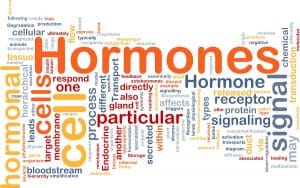Let's talk about PMS, which is for some women, the next key mood-hormone link. For a variety of reasons — nutrition, genetics, hormone balance, etc. — some women sail through monthly cycles with few symptoms, while others struggle every month with debilitating depression, anxiety, and fatigue. While PMS may be a favorite joke of comedians, it's no laughing matter to the women who suffer with it. In recent years, mental health professionals recognized a condition known as premenstrual dysphoric disorder (PMDD) — where hormonal shifts cause anxiety, severe depression and seasonal affective disorder (SAD) in sufferers.
Pregnancy and post-partum are other key points when mind and hormones intersect. Some women have their first experience with significant depression during pregnancy, or after pregnancy (post-partum depression). Moodiness and emotional ups and downs during and after pregnancy are also considered quite common.
The next commonly recognized — but not well-understood — point, is broadly referred to as "menopause." We say broadly, because the term isn't really used properly. Menopause actually refers to the point at which a woman has already stopped having periods for a full year. In the U.S., that happens around age 51 on average. But most of the symptoms associated with menopause — the erratic periods, hot flashes, weight redistribution, brain fog, and changes in sex drive — take place during perimenopause — the time before menopause — when estrogen and progesterone are in decline, but can go up and down erratically. (And what many women don't know is that perimenopause can actually start in some women as early as their late thirties.)
Other sex hormone imbalances — progesterone deficiency, estrogen deficiency or dominance, and testosterone deficiency — can cause a variety of symptoms at any point in life. In men, too much estrogen can cause depression or mood swings, and too little testosterone can cause depression, fatigue, mental fogginess, weight gain, and low sex drive. In women, sex hormone imbalances can cause the whole gamut of mental health symptoms.
Frequently Overlooked Hormonal Imbalances
Many people think "this is it" as far as the connection between hormones and mental health. But actually, there is much more: there are other hormonal imbalances that can have profound effects on mood.
Thyroid issues are an often overlooked, hormonally-triggered cause of symptoms. When the thyroid becomes overactive - hyperthyroidism — symptoms can include anxiety, insomnia, moodiness, panic attacks, and depression. Some women have even been mistakenly misdiagnosed as having panic disorder or anorexia, before properly diagnosed with an overactive thyroid. An underactive thyroid — hypothyroidism — can cause depression, moodiness, fatigue, and in some cases, anxiety as well.
While conventional doctors often rush to prescribe antidepressants, at Holtorf Medical Group, we routinely check patients for thyroid imbalances prior to prescribing any medication for depression. (Interestingly, one symptom of undiagnosed hypothyroidism is depression that does not respond to antidepressant therapy!) Thyroid problems are also more likely to show up during periods of hormonal flux - puberty, pregnancy, post-partum, perimenopause, menopause — and in men, andropause — which makes it even more important to have a full thyroid evaluation done if you experience depression or anxiety during these times of life.
Adrenal issues — imbalances in the body's stress hormones adrenaline and cortisol, and the precursor hormone DHEA — can cause a variety of symptoms that seem to be mental health-related, including depression, anxiety, and insomnia. A chronic excess of stress hormones can make you feel jittery, anxious, unable to sleep, and irritable. A chronic deficiency of stress hormones can make you feel sluggish, tired (even after sleep), moody, depressed, and have difficulty concentrating. Daily fluctuations and imbalances can cause a mix of these symptoms.
The Take Home Message?
Before you go down the road of antidepressants and/or anti-anxiety medications, make sure your physician takes a complete medical history, assesses your symptoms, does a thorough clinical exam, and runs comprehensive blood testing to evaluate and diagnose any hormone balances. Unlike most medications and supplements that support and balance hormones, antidepressants and anti-anxiety medications often have significant side effects, and frequently don't even resolve your symptoms if the underlying cause is, in fact, a hormonal issue.


